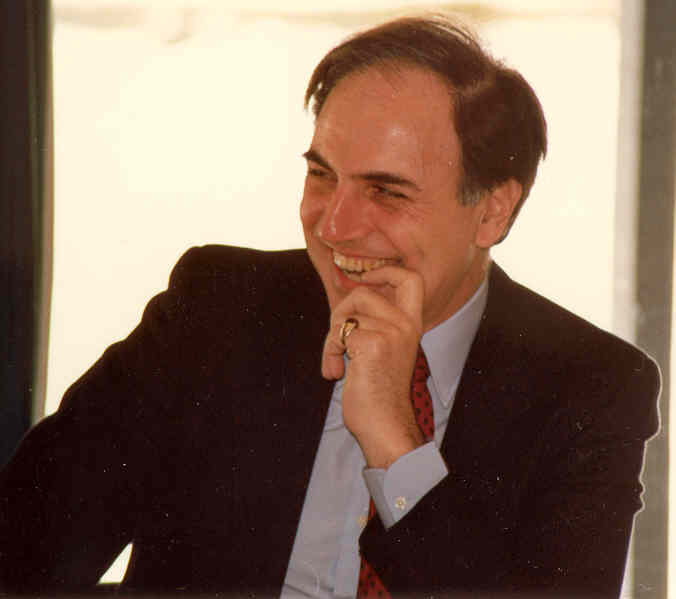The Jewish Humanist Volume 31, No. 6, January 1995
Newt Gingrich has spoken. He wants prayer in the public schools. And so do millions of other American. Most of them are not members of the Religious Right. They just want to improve the personal and social values of their children.
The separation of religion and government is a traditional political principle in our nation. It is embodied in the Bill of Rights of our Constitution. It has been made sacred by the endorsement of Founding Fathers like Thomas Jefferson and James Madison. It has been confirmed by the decisions of the Federal Supreme Court.
Separation in America had three roots. One was pragmatic. America was Protestant. There were many Protestant denominations, none of them holding the allegiance of a majority of the American people. They were often at war with each other, competing for members and state support. It was not feasible to establish any one of them as the state religion. The most practical solution was to establish none of them.
The second root was a minority new among Protestant dissenters, many of whom had come to America. Both the Quakers and the Baptists subscribed to the supreme importance of individual conscience. Religion only had value when it was free and uncoerced. State religion was coercing religion. It had the power to violate individual conscience. It was unacceptable, even though religion and God were indispensable to salvation. Every individual had to work out his own personal connection to God.
The third root was the Enlightenment. The spokesmen of the Enlightenment exalted reason over faith. There were contemptuous of religious superstition. They were hostile to intrusive clergy and established churches. They wanted to mold a new kind of citizen who would assume responsibility for his own life and who would use science as the path to knowledge. They saw no benefit to the state from religion. If individual citizens wanted to be religious, they should pursue it privately in private institutions and at private expense.
The anti-establishment clause of the Constitution arose from these three diverse roots. All three groups were in favor of it, but for different reasons. Ultimately, they would disagree about what “no establishment” meant.
For conservatives, state schools were Protestant schools. They could authorize Protestant prayers and Protestant Bible readings and Protestant holiday celebrations so long as they did not favor any particular Protestant denomination. For moderates, state schools were agencies of an American civil religion, which was neither Protestant nor Catholic, nor Jewish.
They acknowledged the importance of God and prayer and believed that public ceremonies where God was included were perfectly appropriate.
For Catholics separation meant that their children did not have to go to state schools. But it was only fair that the neutral government would support their own parochial schools, as other governments did in many of the countries of Europe.
For liberals, separation meant the total absence of religious vocabulary, religious literature and religious celebration in the public schools and in the public life of the nation. It also meant no state money for religion sponsored schools. Up until the 1960’s the courts did not completely support this position. But in the early 1960’s the Supreme Court explicitly forbade prayer and Bible reading in the public schools. Over the years, with religious diversity the state schools had become increasingly more secular. The Supreme Court confirmed this trend and gave a victory to the liberals.
Through the years the liberal agenda had been ironically reinforced by the hostility between fundamentalist Protestants and the Catholic Church. Many Protestants who were in favor of prayer in the public schools supported a strict separation because they did not want any state money going to Catholic parochial schools. In the past three decades, however, anti-Communism, anti-secularism and anti-feminism have broken down the old hostility and united the Protestant Right with the Catholic Right. It is very important for all of us who embrace the political position of “strict separation” to understand that we can no longer rely on the old religious hatreds to serve our purpose. Anxiety over moral change has broken down the barriers to cooperation.
Some liberals, like Bill Clinton, are running scared. They see compromise as the best strategy. They are willing to settle for a “moment of silence”, but they fail to understand the real nature of the opposition. The opposition feeds on the ever-present anxiety that our children are not receiving the moral training they need to be good citizens. And for most people, moral training is tied up with religion. Prayer and morality go together in their minds.
Most Americans want the public schools to teach values as well as information. They want the schools to be a bulwark against drugs, crime and self-destruction. In the past, public schools did teach the values of good citizenship. And they taught them in a secular way.
Somewhere, along the way, many separationists gave up on the importance of teaching values in the public schools. They replaced values indoctrination with values clarification. They abdicated the responsibility of the schools to provide for direct moral education. Disagreeing on abortion, pre-marital sex and homosexuality does not mean that you cannot agree on self-discipline, responsibility and abstinence from drugs. Relying on the Constitution and the Supreme Court as the chief strategy of survival is a weak program for separationists. Both the Constitution and the Supreme Court can be changed. Strict separationists are a distinct minority in this country.
The most effective counter to prayer in the public schools is to demonstrate that good values can be taught without prayer. The focus of our message must not be only personal freedom and individual conscience. Those issues are not at the heart of the Gingrich initiative. The focus of our message has to be what secular schools can do to enhance the moral behavior of our children. It needs to concentrate less on liberty and more on discipline.

